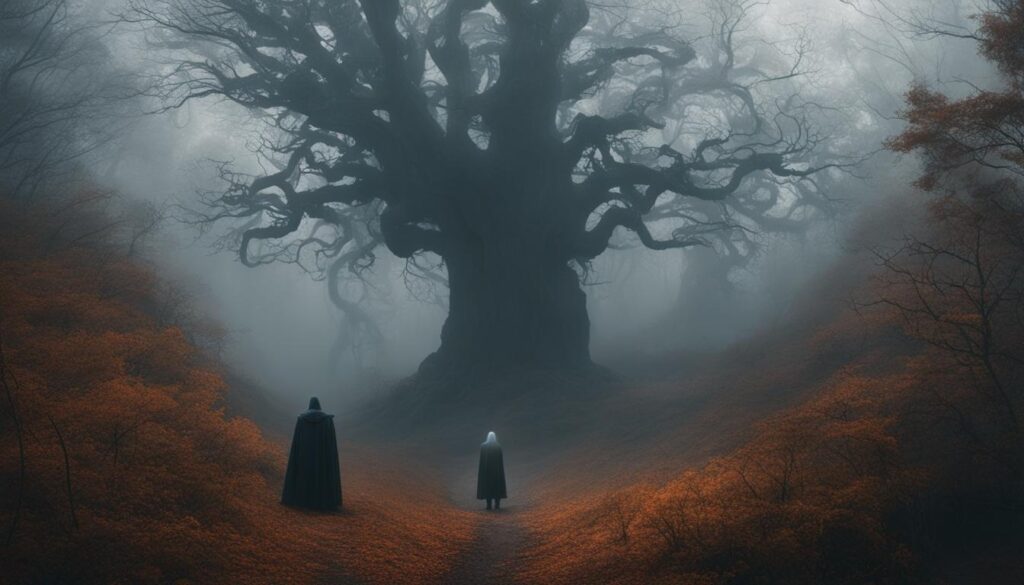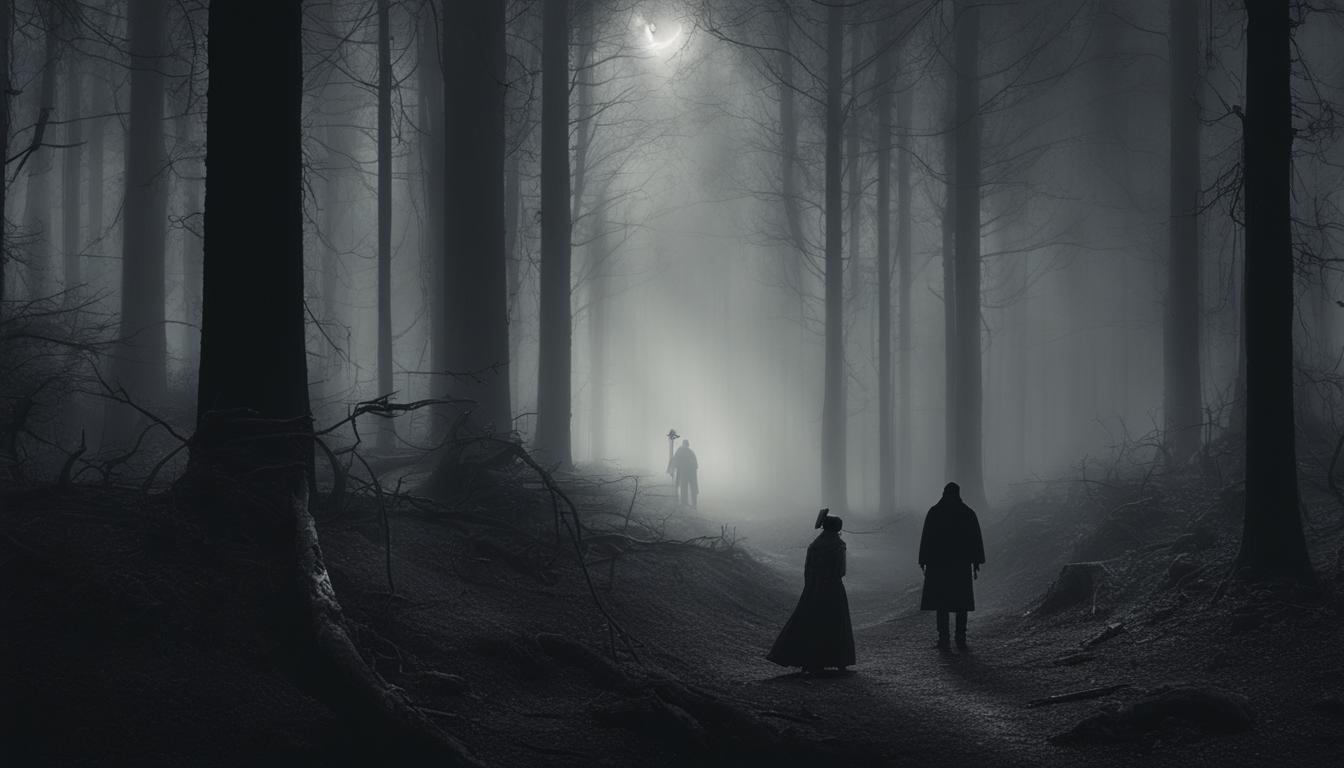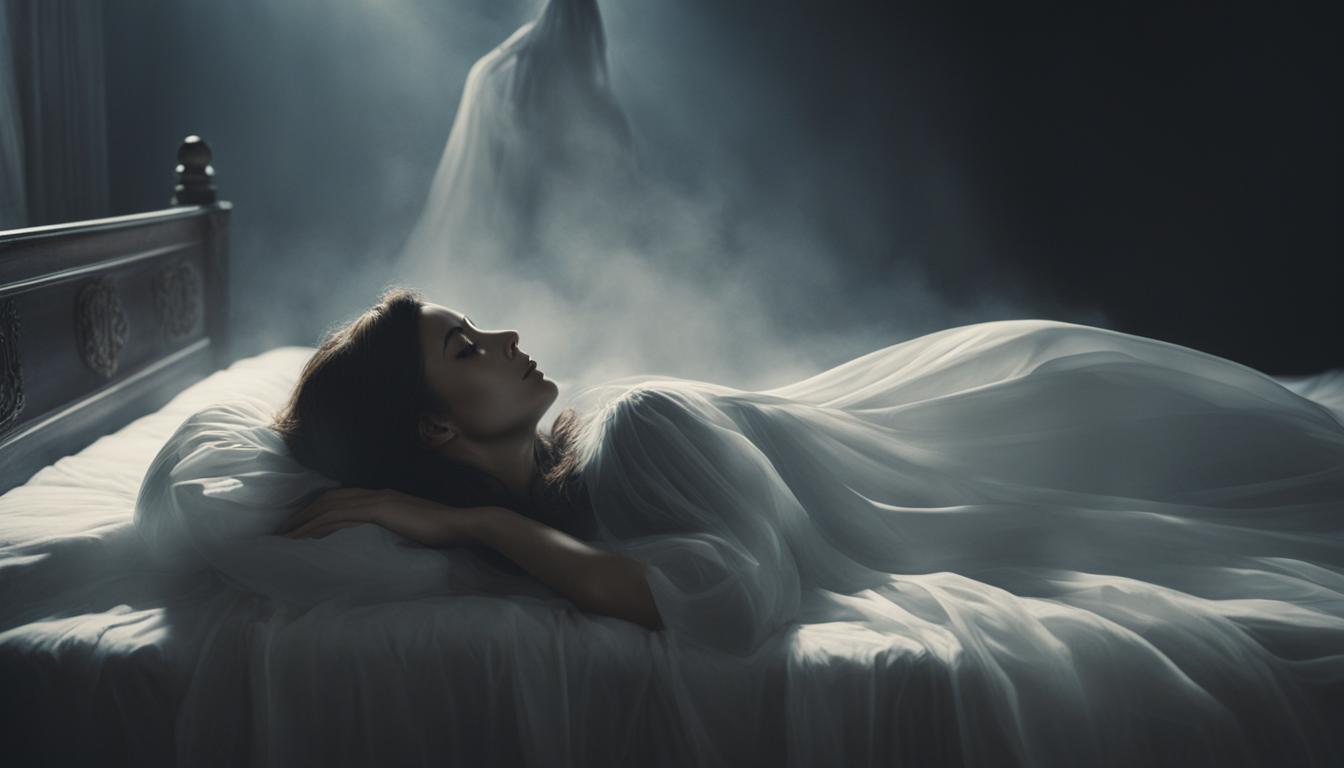Dreams can provide a window into our deepest fears, desires, and anxieties. One common dream that many people experience is seeing their deceased father sick. Interpreting this dream involves considering the dreamer’s emotions, their relationship with their father, and their current circumstances. It may symbolize unresolved emotions or guilt about not spending enough time with their father before his passing. Additionally, dreams are often symbolic, so understanding the symbolic meanings of death, illness, father, and sickness can offer further insights into the dream’s significance.
Key Takeaways:
- Dreams can reveal our deepest fears, desires, and anxieties.
- A dream about a deceased father being sick may symbolize unresolved emotions or guilt.
- Understanding the symbolic meanings of death, illness, father, and sickness can provide further insights into the dream’s significance.
- Interpreting dreams involves considering the dreamer’s emotions, relationship with their father, and current circumstances.
- Dreams are a personal process that requires reflection and introspection.
Understanding Dreams and Dream Interpretation
Dreams are a fascinating phenomenon that can provide valuable insights into our thoughts, emotions, and subconscious desires. When we sleep, our brains enter the REM stage, where they become highly active. It is during this stage that dreams occur. Dream interpretation involves analyzing the symbols and meanings within a dream to gain a deeper understanding of ourselves.
There are various approaches to dream interpretation, each offering unique perspectives. The psychological interpretation focuses on the individual’s emotions and experiences, relating the dream to their current mental state. Freudian interpretation, influenced by Sigmund Freud’s theories, delves into the unconscious mind and explores repressed desires or unresolved childhood conflicts. Jungian interpretation, developed by Carl Jung, emphasizes the symbolism within dreams and their connection to the collective unconscious.
When it comes to interpreting a dream about a deceased father being sick, it is crucial to consider the dreamer’s emotions, their relationship with their father, and their current situation. The dreamer’s emotions may indicate fears or anxieties related to loss or illness. Their relationship with their father can provide insights into any unresolved issues or past traumas. Additionally, understanding the symbolic meanings of death, illness, father, and sickness can offer further insights into the dream’s interpretation.
The Different Approaches to Dream Interpretation
- Psychological Interpretation: Focuses on the individual’s emotions and experiences, relating the dream to their current mental state.
- Freudian Interpretation: Explores the unconscious mind and looks for repressed desires or unresolved childhood conflicts.
- Jungian Interpretation: Emphasizes the symbolism within dreams and their connection to the collective unconscious.
Interpreting a Dream about a Deceased Father Being Sick
Interpreting a dream about a deceased father being sick requires taking into account the dreamer’s emotions, their relationship with their father, and their current situation. By analyzing these factors, it is possible to gain a deeper understanding of the dream’s meaning.
The dreamer’s emotions may reveal fears or anxieties related to loss or illness. It is essential to explore these emotions and consider any unresolved issues or past traumas that could be influencing the dream. The dreamer’s relationship with their father can provide valuable insights into their feelings and experiences related to their father figure.
In addition to the dreamer’s emotions and relationship with their father, understanding the symbolic meanings of death, illness, father, and sickness can offer further insights into the dream’s interpretation. Dreams are often symbolic, and these symbols can provide clues to the dreamer’s subconscious desires, fears, or the need for closure and acceptance.
| Dream Interpretation Approaches | Key Focus |
|---|---|
| Psychological Interpretation | Individual’s emotions and experiences |
| Freudian Interpretation | Unconscious mind and repressed desires |
| Jungian Interpretation | Symbolism and the collective unconscious |
The Symbolic Meanings of a Dream about a Dead Father Being Sick
Dreams often carry symbolic meanings, and when it comes to dreaming about a dead father being sick, there are several possible interpretations to consider. Such a dream may reflect unresolved grief or regret related to the father’s passing, suggesting that the dreamer may still be struggling to come to terms with the death or harboring unresolved emotions about their relationship with their father. It could also indicate a fear of losing a father figure in their life, which may be connected to a current relationship or a fear of losing guidance and support.
Furthermore, the dream might serve as a symbolic message from the subconscious, emphasizing the dreamer’s need to take care of themselves or others, release feelings of guilt, or take responsibility for their own life choices. Understanding the symbolic meanings of death, illness, father, and sickness can provide further insight into the interpretation of such a dream. By delving into these symbols and their associations, the dreamer can gain a deeper understanding of their own emotions and subconscious desires.

In a broader context, dreams can be rich in symbolism and offer valuable insights into our innermost thoughts, feelings, and fears. The interpretation of dreams is a deeply personal process, as each individual brings their own unique experiences and emotions to the dream world. By exploring the symbolic meanings of a dream about a dead father being sick, we can begin to unravel the layers of our subconscious and gain a better understanding of ourselves.
Table: Symbolic Meanings in a Dream about a Dead Father Being Sick
| Symbol | Meaning |
|---|---|
| Death | Symbolizes endings, transition, and change |
| Illness | Represents vulnerability, fear, or a need for healing |
| Father | Symbolizes authority, guidance, and support |
| Sickness | Signifies emotional or psychological distress, unresolved issues, or a call for self-care |
Dream Variations and Interpretation of Seeing a Deceased Father Sick
Dreams about a deceased father being sick can manifest in various ways, each carrying its own significance and interpretation. These dream variations offer valuable insights into the dreamer’s emotions, thoughts, and subconscious desires. Understanding these different scenarios can help unravel the hidden meanings within the dream, providing a deeper understanding of its interpretation.
One variation of this dream is witnessing oneself taking care of a sick father. This could indicate a longing for the presence or guidance of the deceased father during challenging times. It may reflect a desire for comfort, support, or missed opportunities to spend quality time together. Feeling powerless to help the sick father in the dream can symbolize frustration and helplessness in the dreamer’s waking life, highlighting unresolved emotions or a lack of control over certain situations.
| Dream Variation | Interpretation |
|---|---|
| Taking care of a sick father | Longing for guidance and support |
| Feeling powerless to help the sick father | Frustration and helplessness in waking life |
| Deceased father recovering | Hope for positive change |
| Deceased father dying again | Difficulty letting go and moving forward |
On the other hand, dreaming of a deceased father recovering from illness can symbolize hope for positive change in the dreamer’s life. It may represent a desire for healing, growth, or a fresh start. Conversely, dreaming of the father dying again may indicate the dreamer’s struggle to let go of their father’s memory and move forward. This dream variation suggests unresolved grief or a reluctance to accept the reality of the father’s passing.
Exploring these dream variations provides a comprehensive understanding of the dreamer’s emotions and subconscious desires. It is essential to consider each dream element’s symbolic meaning, such as father, illness, recovery, or death, to decode the dream’s hidden messages. By unraveling the dream’s variations, one can gain valuable insights into their own psyche, leading to personal growth and emotional healing.
Reflecting on the Dream and Real-Life Connections
After analyzing and interpreting the dream of seeing your dead father sick, it’s crucial to reflect on how the dream made you feel and how it relates to your real life. This self-reflection can provide valuable insights into your thoughts, emotions, and subconscious desires, serving as a starting point for personal growth and emotional healing.
Consider the emotions that arose during the dream. Did you feel sadness, guilt, fear, or confusion? These emotions can offer clues about unresolved issues or unexpressed feelings in your waking life. It’s important to explore these emotions and their connection to your relationship with your father. Reflect on your memories, experiences, and any unresolved issues you may have had with him.
Furthermore, examine how the dream may relate to your current circumstances. Are there any challenges, changes, or emotions that parallel the themes of illness, loss, or fatherhood? Perhaps the dream is urging you to confront and address these issues in order to find healing and resolution.
Incorporate your dream analysis into your life by taking actionable steps. This could involve seeking therapy or counseling, having open conversations with loved ones, or engaging in self-care practices. Remember, dream interpretation is a personal and subjective process, so trust your instincts and follow the path that feels most authentic to you.
Key Points:
- Reflect on how the dream made you feel and its connection to your real life.
- Explore the emotions that arose during the dream and their relationship to your relationship with your father.
- Consider how the dream may relate to your current circumstances and challenges.
- Take actionable steps based on your dream analysis, such as seeking therapy or engaging in self-care practices.
Exploring Other Dead Father Dream Meanings
Dreams about a dead father can hold significant meaning beyond just being sick. Different dream scenarios involving the deceased father can offer additional insights into the dreamer’s emotions and subconscious desires. Let’s explore some of these variations:
Dreams of Communication:
Oftentimes, dreaming of a deceased father talking or communicating can convey powerful messages. It might be a warning, a declaration of love, or a sign of support and guidance from beyond. These dreams indicate that the dreamer may be seeking reassurance or advice from their father figure.
Unresolved Issues and Past Traumas:
Dreams in which the dead father appears angry can signify unresolved issues or past traumas that the dreamer has not yet addressed. These dreams may serve as a reminder to confront and heal from emotional wounds associated with the father’s passing or their relationship.
Symbols of Happiness and Longing:
On the other hand, dreams depicting the dead father smiling or hugging can represent a sense of happiness, contentment, or a longing for affection. These dreams often highlight the dreamer’s desire for emotional connection and warmth that they may feel is missing in their waking life.
Furthermore, dreams of a dead father coming home, sleeping, or being in a hospital can symbolize personal transitions, healing, and the need for self-care. These dreams may be a reflection of the dreamer’s own journey of growth, recovery, and healing.
Exploring these various dream meanings can provide a more comprehensive understanding of the dreamer’s emotions and subconscious desires. Each dream variation offers unique insights into the dreamer’s relationship with their deceased father and how it influences their waking life. It’s important to reflect on these dreams and their connections to real-life experiences to gain a deeper understanding of oneself and foster personal growth.
| Dead Father Dream Meanings | Symbolic Interpretation |
|---|---|
| Talking or Communicating | Messages of warning, love, support, or guidance from beyond |
| Angry | Unresolved issues or past traumas |
| Smiling or Hugging | Happiness, contentment, or a longing for affection |
| Coming Home, Sleeping, or Hospital | Personal transitions, healing, and the need for self-care |

Conclusion
Dreaming about a dead father being sick can hold deep psychological and symbolic meaning. The interpretation of such dreams may vary, but they often reflect unresolved emotions, fears, or a need for closure and acceptance. Understanding the symbolic meanings of death, illness, father, and sickness can provide valuable insights into the interpretation of these dreams.
Reflecting on the dream and its connections to real-life experiences is essential for personal growth and emotional healing. This introspection allows the dreamer to gain a better understanding of their own emotions and can serve as a starting point for making positive changes in their life.
Exploring different variations of dead father dreams and their meanings can provide a more comprehensive understanding of the dreamer’s subconscious desires. Remember, dream interpretation is a personal process that requires reflection and introspection. By delving deeper into the symbolism and reflecting on the dream’s emotional impact, the dreamer can unlock the hidden meanings within their dreams.
FAQ
What is the meaning of seeing your dead father sick in a dream?
The meaning of seeing your dead father sick in a dream can vary, but it may reflect unresolved emotions, fears, or a need for closure and acceptance.
How can dream interpretation help in understanding dreams?
Dream interpretation can provide valuable insights into our thoughts, emotions, and subconscious desires, helping us understand ourselves better.
What are the symbolic meanings of a dream about a dead father being sick?
The dream may symbolize unresolved emotions or guilt, a need for closure or acceptance, or other symbolic representations related to death, illness, father, and sickness.
Are there variations of dreams about a dead father being sick?
Yes, dream variations can include dreams of taking care of a sick father, feeling powerless to help, or even dreams of the deceased father recovering or dying again.
How can reflecting on the dream and real-life connections be beneficial?
Reflecting on the dream and its connections to real-life experiences can provide insights into thoughts, emotions, and subconscious desires, guiding personal growth and emotional healing.
Are there other dream meanings related to a dead father?
Yes, dreams of a deceased father talking, smiling, hugging, or being angry can offer additional insights into love, support, unresolved issues, past trauma, happiness, contentment, and affection.
What is the importance of dream interpretation in personal development?
Dream interpretation can serve as a starting point for personal growth and emotional healing, allowing individuals to gain a better understanding of their own emotions and make positive changes in their life.





